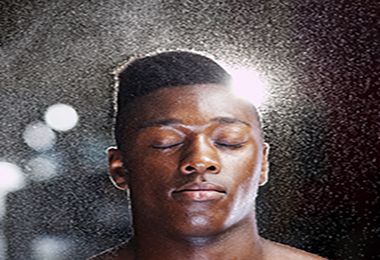
Bottled = Better
My tap water isn’t the hardest there’s ever been, but I’m still not a fan of how it changes my texture from caress-worthy to crunchy if I don’t jump on my post-wash moisturizing with the speed it needs. To keep things soft, I’ll usually splurge on a big bottle of Smartwater or rainwater, if I can get it. And yes, paying five dollars for a bottle of water would usually be a no from me, but once you frame it as ‘I’m buying a hair product’ as opposed to ‘I’m going to put this back in the water cycle about an hour from now’, it gets much easier to swallow…so to speak.
No teas, please
I’ve heard of the benefits of tea rinses, and the darkening strengthening effects of black tea in particular. But pouring a portion of my morning cuppa into my spritzer had me smelling something…off after a couple of days, but I couldn’t put my finger on it. It wasn’t much longer before could see what it was. Despite using unsweetened tea from a clean pot, my spray was growing bacteria—thick, gross, ropy strands of bacteria. Alcaligenes viscolactis is, according to Snopes, the reason you need to be extra careful making your summertime sun tea, and my reason for leaving any and all teas in my fridge, and out of my spray bottles. If you do want to spritz with tea, follow the same rules for the easy-brew sun cooked stuff: clean your bottle (including the spray tube!”> thoroughly before and after use, and only make what you plan to use that day.
Coming up roses
There’s really not a lot rosewater can’t do for you. As a distillate, rose water is a coproduct of the production of rose essential oil—and still retains some of the emollient properties of rose oil along with the same distinctly pleasing scent as the flower it’s made from. Rose water works to moisturize and soften my hair, and help keep things elastic for those times that I procrastinate on taking my crochet braids out (which is most times, to be real”>. Although it does more than scent, the smell does absolutely make me feel like bonafide royalty, and you can’t argue with the confidence boost that ruling an empire gives you—even if the UN won’t recognize your apartment’s sovereignty. I like a 2:1 ratio of water to Cortas rose water, which you can find at Mediterranean, Indian, and Middle Eastern aisles and stores near you!
Let’s clear things up
Whatever your nose can’t tell you, your eyes can! I haven’t had any issues with bacteria or mold since my Austin Tea Party left me dumping my bottle and furiously scrubbing my scalp, but just to be sure, I’ve repurposed my metal travel size bottles to be for cleaning products only. It’s true that by the time you can see microbial or fungal colonies with your bare eyes, you’ve already been consuming them in small quantities—but that’s no reason to keep yourself, or your daily spritzer, in the dark.
Non-Essential Oils
This is about 3rd-grade level science here, but oil and water don’t mix. I did use to add a few drops of essential oils to my spray bottles, not so much because I was eager to get my aerobics in by shaking the oil off the surface level every day, but because the scent would still come forth when sprayed. But there’s a reason why most essential oils are packaged in dark amber glass—they’ll break down from light exposure otherwise. When EOs do break down, effects can range from simply not smelling as nice to becoming an irritation hazard. And unless you’re breaking out the autoclave each time you refill, not all of it’s getting out of the bottle. No thanks.
Finding that perfect mister combo got me like:
I’ve found an everyday misting cocktail that makes it happen for me and my 4B, but what works for you?


